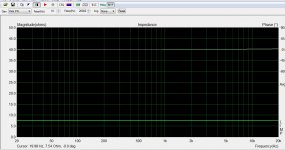I'd rather be quick and dirty if it gets the information I need in a trustworthy manner.
Sorry for the slow response, but... is this supposed to be a joke?
Do you check the code line by line?
Actually, yes. First I write the code, then I check my work.
It is possible to verify that the software seems to be working like it should and doing so is good practice. But that just adds one more layer of elaboration.
Uhm, is this another dimension of your joke above? Don't you test things to make sure the software (and everything else) is set up correctly and works as it should?
have you guys tried using an amp in your setup?
do this first instead of modding the soundcard.
see post 12
do this first instead of modding the soundcard.
see post 12
have you guys tried using an amp in your setup?
do this first instead of modding the soundcard.
see post 12
Thats a diy audio forum. So...why do it the easy way? 😀
have you guys tried using an amp in your setup?
do this first instead of modding the soundcard.
see post 12
Currently I am not trying to achieve power. I need this card for driver TS measurements.
And if the output is pre filtered ( with the RC ) the power amp is not going to help. We need impedance curve flat deep down to 10Hz at least.
have you guys tried using an amp in your setup?
do this first instead of modding the soundcard.
see post 12
Probably what you said makes sense. I simulated it. and if we use high input impedance amp it should solve the problem.

Some looooong time later I`ll dig this one up. Here is a measurement done on a standard wirewound resistor using a proper audio interface (USB powered Komplete Audio 6). You can see the differences to the Behringer.
Modified Behringer, right ?
Yes it gives good results. I too will post soon when I get time.
There is an internal crosstalk in the behringer uca202/222, to work around this i use two, one for the output and one for the input - works great!
But even better with um22 as output since it can do higher levels of output
But even better with um22 as output since it can do higher levels of output
Modified Behringer, right ?
No, the measurement was taken using a Komplete audio 6 interface, not the Behringer.
Besides that, the impedance rises as the frequency goes down.
Perhaps you could try the method of measuring impedance as described here:
https://www.diyaudio.com/forums/sof...peaker-impedance-holmimpulse.html#post5657983
Since I have no extra sound card other than onboard sound chip without a line IN, I have measured voltage drops with Clio card, then imported these into HolmImpulse.
Not sure if you are still using the UCA202, but I finally got around to posting a fix for the crosstalk.There is an internal crosstalk in the behringer uca202/222, to work around this i use two, one for the output and one for the input - works great!
I would have posted it here, but only found this thread today.
Behringer UCA202: Fixing the Low Frequency Cross-talk
- Home
- Loudspeakers
- Multi-Way
- Problems with impedance measurement
